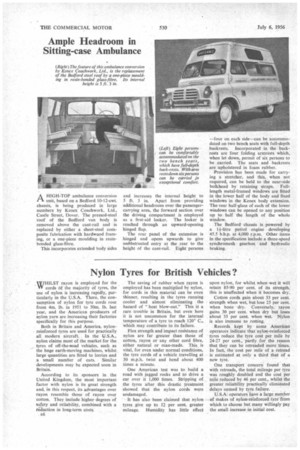Nylon Tyres for British Vehicles?
Page 54

If you've noticed an error in this article please click here to report it so we can fix it.
, WHILST rayon is employed for the YV cords Of the majority of tyres, the use of nylon is increasing rapidly, particularly in the U.S.A. There, the consumption of nylon for tyre cords rose from 4m. lb. in 1951 to 50m. lb. last year, and the American producers of nylon yarn are increasing their factories specifically for this purpose.
Both in Britain and America, nylonreinforced tyres are used for practically all modern aircraft. In the U.S.A., nylon claims most of the market for the tyres of off-the-road vehicles, such as the huge earth-moving machines, whilst large quantities are fitted to lorries and a small number of cars. Similar developments may be expected soon in Britain.
According to its sponsors in the United Kingdom, the most important factor with nylon is its great strength and, in this respect, its advantages over rayon resemble those of rayon over cotton. They include higher degrees of safety and reliability, combined with a ruction in Jong-term cOsts.
E6 The saving of rubber when rayon is employed has been multiplied by nylon, for cords in this material can be even thinner, resulting in the tyres running cooler and almost eliminating the hazard of "heat blow-out." This is a rare trouble in Britain, but even here it is not uncommon for the internal temperature of a tyre to reach 120° C., which may contribute to its failure.
Flex strength and impact resistance of nylon are far greater than those of cotton, rayon or any other cord fibre, either natural or man-made. This is vital, for even under normal conditions, the tyre cords of a vehicle travelling at 30 m.p.h. twist and bend about 400 times a minute.
One American test was to build a road with jagged rocks and to drive a car over it 1,000 times. Stripping of the tyres after this drastic treatment showed that the nylon cords were undamaged.
• It has also been claimed that nylon tyres give up to 12 per cent, greater mileage. Humidity has little effect upon nylon, for whilst when wet it will retain 85-90 per cent. of its strength, this is unaffected when it becomes dry.
Cotton cords gain about 33 per cent. strength when wet, but lose 25 per cent. when bone dry. Conversely, rayon gains 30 per cent. when dry but loses about 33 per cent, when wet. Nylon is also immune to rotting.
Records kept by some American operators indicate that nylon-reinforced tyres reduce the tyre cost per mile by 24-27 per cent., partly for the reason that they can be retreaded more times. In fact, the cost per mile of a retread is estimated at only a third that of a new tyre.
One transport concern found that with retreads, the total mileage per tyre was roughly doubled and the cost per mile reduced by 46 per cent., whilst the greater reliability practically eliminated delays caused by tyre failure.
U.S.A: operators have a large number of makes of nylon-reinforced tyre from which to choose but many willingly pay the small increase in initial cost.
























































































































